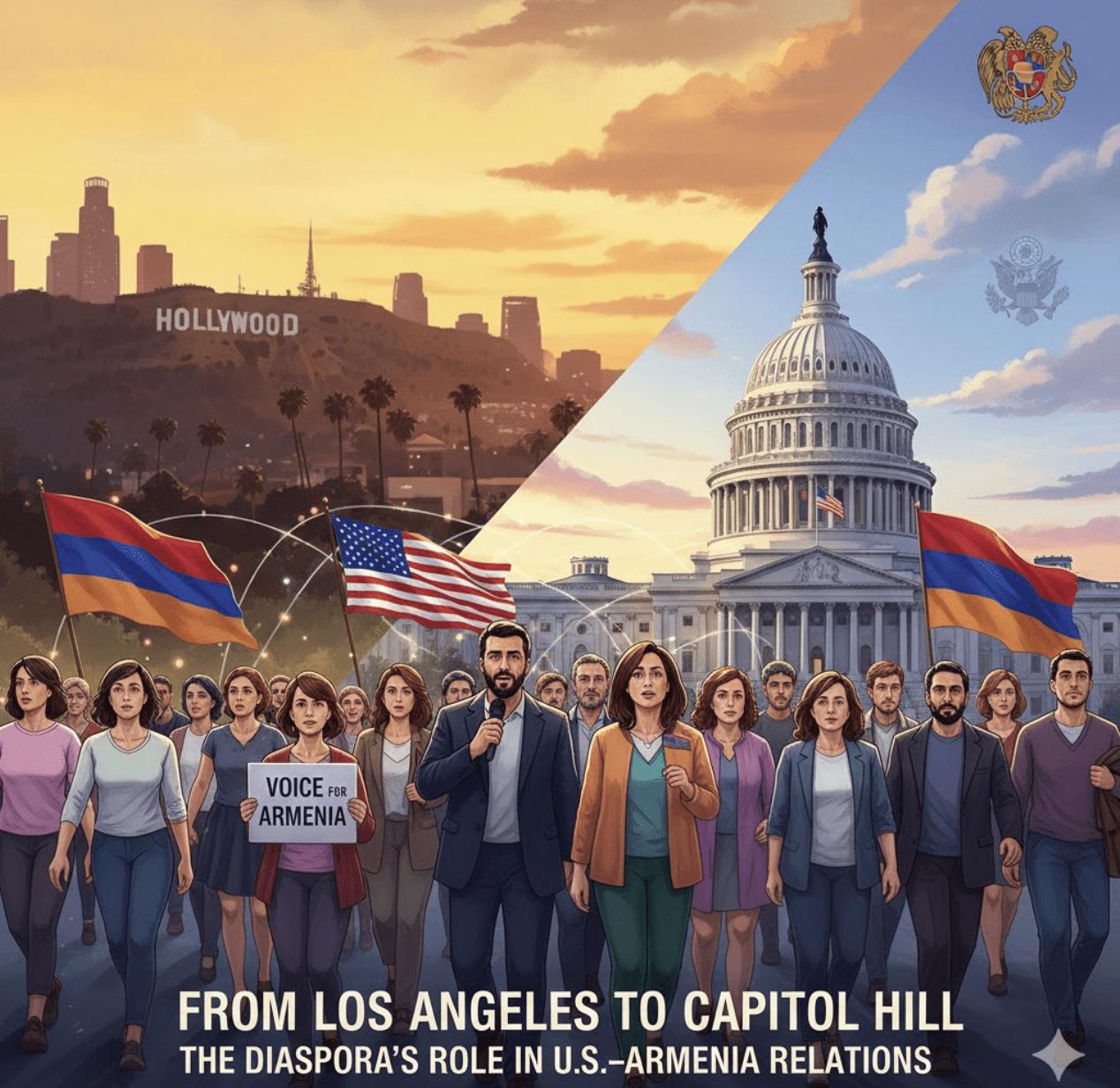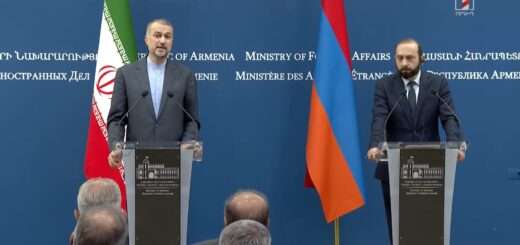From Los Angeles to Capitol Hill: The Diaspora’s Role in U.S.–Armenia Relations

The Armenian diaspora in the United States plays a central role in shaping U.S. policy toward Armenia and the South Caucasus. Concentrated in Greater Los Angeles, New York, Boston, New Jersey, Michigan, and Pennsylvania, it forms one of the largest and most politically active Armenian communities outside Armenia. Two organizations dominate its political activity: the Armenian National Committee of America (ANCA) and the Armenian Assembly of America. Both maintain offices in Washington, organize annual “Hill Days,” prepare congressional briefings, circulate letters to the State Department, and provide testimony in hearings. They also track elections, meet with congressional staff, and mobilize constituents. Members of Congress pay attention because Armenian-American voters can be decisive in swing districts. Their advocacy ensures that Armenian issues, from security to human rights, receive concrete consideration in U.S. policy debates. ¹
The 2018 Velvet Revolution brought a change in Armenia’s domestic politics. When Nikol Pashinyan took office, his government promised reforms to reduce corruption and strengthen the rule of law. Diaspora groups in the United States responded by adjusting their advocacy. ANCA began urging Congress to link U.S. assistance to governance benchmarks and transparency measures.² The diaspora no longer relied solely on historical narratives. Instead, it pressed for concrete policy actions that reflected Armenia’s domestic reforms.
The 2020 war in Nagorno-Karabakh disrupted both Armenia’s internal reforms and diaspora expectations. Armenia suffered territorial losses and widespread displacement from Artsakh. Diaspora organizations responded quickly. They organized humanitarian aid, amplified refugee accounts, and pushed Congress to condition U.S. military support to Azerbaijan. ANCA and allied groups lobbied for the enforcement of Section 907 of the Freedom Support Act, requiring that aid to Baku meet strict human rights standards.³ Congressional letters, amendments, and public statements reflected this pressure, forcing the U.S. State Department and Defense Department to respond. The diaspora’s engagement demonstrated that Congress treats Armenian concerns as both moral and political issues.
Since 2018, the Armenian government and the diaspora have shared goals such as sovereignty, reform, and international support. But they often differ in approach. These disagreements become particularly visible in three areas. First, timing and compromise. Diaspora groups call for immediate action to secure the rights of displaced people and prisoners of war. The government negotiates incrementally, seeking to prevent renewed conflict and maintain stability. For example, diaspora organizations demanded unconditional and immediate return plans for Artsakh residents, while the government pursued phased arrangements to secure borders safely. Second, historical versus pragmatic priorities. Diaspora groups emphasize justice, recognition of the Armenian Genocide, and protection of cultural sites. The government sometimes moderates rhetoric to keep dialogue open with Turkey and Azerbaijan. When Yerevan explored normalization with Ankara, diaspora leaders criticized the move as premature. Government officials countered that trade and transport links could improve Armenia’s security and economy. Third, transparency and public information. Diaspora groups expect full disclosure of international agreements, while the government treats some details as confidential to protect negotiation leverage. This difference became evident when Armenia hired Mercury Public Affairs in 2025 to represent the country in Washington. The diaspora questioned why the government would contract a firm with past ties to Ankara instead of relying on long-established advocacy networks.⁴
In January 2025, Armenia and the United States signed a Charter on Strategic Partnership, establishing cooperation on governance, energy diversification, and defense.5 Diaspora groups supported structured U.S. engagement but remained cautious, concerned that a government-led lobbying approach could sideline grassroots influence. The Charter represented Armenia’s attempt to expand ties with Washington while reducing dependence on Russia.6
The August 8, 2025, peace declaration, mediated by the White House, tested these dynamics further. The agreement included mutual recognition between Armenia and Azerbaijan, reopened trade and transport, and established a corridor connecting Azerbaijan’s mainland to its Nakhichevan exclave through Armenia’s Syunik province.7 U.S. officials presented the deal as a step toward regional stability and economic connectivity. The Armenian government framed the corridor as Armenian-administered, offering practical benefits for regional trade and investment. The diaspora, however, criticized the agreement, arguing that it failed to guarantee the safe return of displaced residents and risked ceding effective control of Armenian territory. ANCA publicly warned Congress not to reward Azerbaijan without conditions on prisoners, human rights, and displaced persons.4
The diaspora’s influence extends to the legislative process. Groups like ANCA draft proposed language for amendments, meet with sympathetic lawmakers, and provide testimony or briefing materials to congressional staff. In March 2025, sixty members of the House of Representatives, led by Representatives Mike Lawler and Frank Pallone Jr., urged enforcement of Section 907 until Azerbaijan met specific conditions.8 These interventions show that Congress considers diaspora concerns when shaping policy, and that U.S. negotiators must account for both executive objectives and grassroots expectations. The weight of diaspora opinion is magnified by its political visibility in districts that can swing elections, giving its advocacy a direct impact on U.S. decision-making.
The postwar period highlights both convergence and tension between government and diaspora priorities. The Armenian government focuses on practical outcomes and stepwise reforms, viewing corridor agreements and normalization efforts as tools for economic growth and security. Diaspora organizations prioritize historical justice, sovereignty, and protection of displaced communities. The Mercury lobbying contract illustrates the ongoing struggle over who speaks for Armenia in Washington. The government seeks a professional, centralized voice; the diaspora relies on decades of volunteer networks and congressional connections. Both forms of advocacy coexist, shaping U.S. policy from complementary and sometimes conflicting angles.
The future of the U.S.–Armenia relations depend on several factors. Legislative outcomes, particularly in FY 2026 appropriations and the National Defense Authorization Act, will indicate how effectively diaspora advocacy converts into law. The practical implementation of corridor agreements will test Armenian sovereignty and U.S. mediation credibility. Coordination between the Armenian government, professional lobbyists, and diaspora organizations will determine message clarity and public understanding. Diaspora investment in Armenia could reinforce policy priorities by linking economic and political interests.
Armenia’s foreign policy after the 2020 war exists at the intersection of domestic politics, diaspora influence, and international constraints. Russian security support has weakened, the European Union remains cautious, and the United States has reasserted itself through structured agreements. The diaspora remains a critical factor, able to influence U.S. policy by shaping legislative decisions and public discourse. Its role demonstrates that small states rely not only on government diplomacy but also on citizen networks abroad.
In conclusion, Armenian-American lobbying has become a decisive force in U.S.–Armenia relations since 2018. The diaspora now focuses on policy advocacy, pressing for conditional U.S. support, human rights enforcement, and guarantees for displaced communities. The Armenian government pursues pragmatic agreements while balancing domestic reform and regional security. Disagreements over timing, compromise, and transparency remain significant, highlighting the ongoing tension between diaspora priorities and state-led diplomacy. For U.S. policymakers, listening to the diaspora is not optional; its networks in swing states make it a decisive actor in shaping American engagement in the South Caucasus.
Contributed by Asya Gasparyan, a PhD Researcher at the School of International Studies, University of Trento, Italy. Additionally, she holds the position of Research Fellow at the Regional Studies Center, Yerevan, Armenia.





